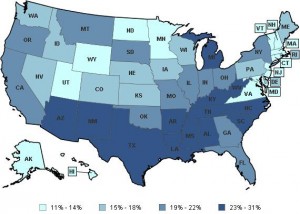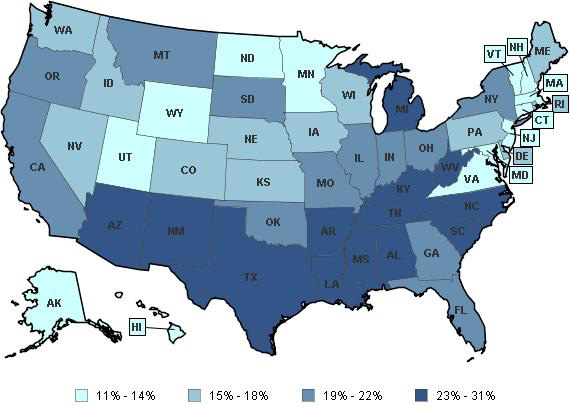 If you are a child in the United States living in poverty you probably live in the South. According to U.S. census data from 2009 (the last year data are available) the 10 states with the highest rates of child poverty were all in the South. All 10 states had child poverty rates more than 20 percent. In Mississippi, one out of every three children lives in poverty.
If you are a child in the United States living in poverty you probably live in the South. According to U.S. census data from 2009 (the last year data are available) the 10 states with the highest rates of child poverty were all in the South. All 10 states had child poverty rates more than 20 percent. In Mississippi, one out of every three children lives in poverty.
A look at teen birth rates reveals a similar cluster. The South is home to all 13 states with the most teen births.
For those who have watched Southern society for many years, the problem is as much cultural as it is economic.
According to Dr. Harvey Jackson, an expert on Southern history and Eminent Scholar in history at Jacksonville State University in Alabama, the statistics are not surprising.
“There are more children in poverty because there are more adults in poverty,” Jackson said. “This is a region of the country in which adults are poor and yet adults continue to have children even though they are poor.”
The problem is social, he says, especially concerning teen births.
“There are real cultural attitudes [in the South] that have to do with large families and premarital sex,” Jackson said. “And it is less condemned in certain communities in the South, particularly among the poor.
“If you’re going to deal with poverty or violence or any thing that a good Bible Belt place should not tolerate you’re going to be dripping with irony all the way to the publisher,” Jackson said.
Poverty in the South is also a product of years of under-investment in schools, after-school programs and hospitals, according to Tara Manthey, communications director for the Arkansas Advocates for Children and Families. These are all things that “we know help children and families thrive,” she said.
On top of that, southern states have more single-parent households, Manthey said. “That not only drags down their current income but also their potential income because the parent isn’t able to build assets or build education in the way that a two-parent family could,” she said.
But a solution won’t be easy to come by, Jackson says. “If you want to improve the lot of children you’ve got to improve the lot of adults, which makes the whole thing a whole lot more different.”
“Many Southerners have let poverty go because [they think] you can always count on the federal government to keep people from starving,” Jackson said. But funding to southern states is drying up, he says.
The recently published 2011 Kids Count Data Book by the Annie E. Casey Foundation says:
The research is clear: Children who grow up in low-income families are less likely to successfully navigate life’s challenges and achieve future success. The younger they are and the longer they are exposed to economic hardship, the higher the risk of failure.
The report goes on to say a two-generation strategy is necessary to reverse the poverty trend. That strategy would “help parents put their families on a path to economic success” and “enhance children’s social, emotional, cognitive and physical development from birth.”
